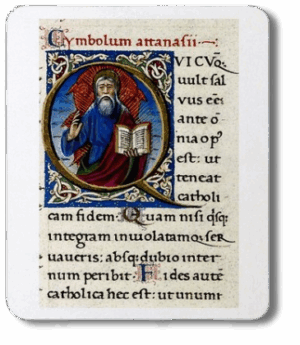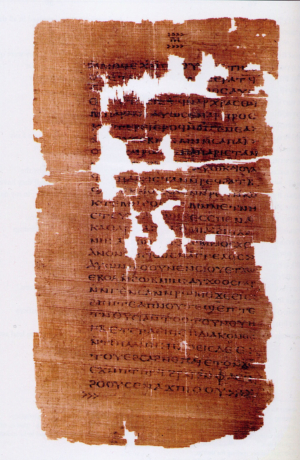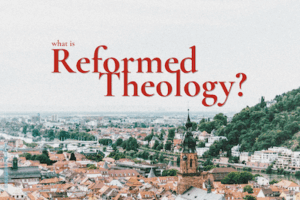“So the Father is God, the Son is God, and the Holy Ghost is God. And yet they are not three Gods, but one God” (Athanasian Creed). How can God be truly one and also three distinct, co-eternal subsistences or persons is a mystery; and yet we are bound to say that he is. Continue reading →
Author Archives: R. Scott Clark
The Splendor Of The Three-In-One God: The Necessity And Mystery Of The Trinity (Part One)
“Hear, O Israel, the Lord our God, the Lord is one!” (Deut 6:4) In contrast to the polytheistic religions of her neighbors, Israel was made deeply conscious of the fact that there is only one God (hence, the term, monotheism). The monotheistic . . . Continue reading →
Why The Nicene Creed And Why One God?
This year, the Nicene Creed is 1700 years old, and here we are still paying attention to it. By any measure, that is an impressive achievement. The number of historical and cultural artifacts to which we still pay attention and which we . . . Continue reading →
Conspiracies: The Temptation Of Cultural Gnosticism
If you ever want to get the ear of a crowd just whisper these words: I have a secret. The crowd will come to order quickly and listen with rapt attention. It is almost as if we are wired to hear secrets. . . . Continue reading →
This Christian Life
One of my favorite radio programs is This American Life starring Ira Glass. I stumbled across this show several years ago, and for a while I did not understand why I was so attracted to it. Glass does not have a classic . . . Continue reading →
What Is Reformed Theology? (Part 7)
There was a time when most of the world was outside the promises and people of God (Eph 2:12). From the formation of the national Israelite church under Moses, the world was, from the biblical perspective, divided between Jews and Gentiles. The temporary ceremonial and judicial laws, which were fulfilled by Christ and which expired with and were abrogated by his death (Acts 10 [all]), taught that not only certain foods were unclean (and illegal) and defiling but also that whole people groups were also unclean and defiling. Since the Lord instituted the sacrament of circumcision under Abraham (Gen 17:9–14) the Jewish church had been literally and figuratively cut off from the surrounding Gentile religions. Continue reading →
What Would Calvin Say About Premillennialism?
In 2007, a prominent evangelical (Bible church) pastor suggested that were Calvin alive today he would be premillennial and that true Calvinists should be (pre-trib, Dispensational) premillennialists.1 Some of us were a little surprised about this breakthrough in Calvin studies coming from . . . Continue reading →
What Is Reformed Theology? (Part 6)
There are Christian traditions that speak of Jesus’ death as primarily an example and there are those that speak exclusively of Jesus’ death relative to his victory over death but the most basic choice we must make is whether he died as . . . Continue reading →
Every Sunday Reformation Sunday
We confess sola gratia (by grace alone) and sola fide (through faith alone), as the response to the Romanist doctrine that we are justified and saved by the infusion of a medicinal substance (which they call grace), with which we are said to cooperate unto sanctification and thence, eventually, to justification. No, salvation (deliverance from the wrath to come, righteousness with God, and progressive sanctification) is God’s free gift. Grace is not a medicinal substance with which we are infused. It is God’s favor merited for us by Christ’s perfect righteousness earned for us and freely imputed to us by God. Faith is not a virtue formed by love but the gift of God with which we freely receive, rest in, and trust Christ and all of his righteous and suffering obedience for us. Continue reading →
5 Reformation Doctrines That Still Transform The Church
By most accounts, the Reformation began when a young monk challenged ecclesiastical and academic authorities to debate a controversial practice that had developed in the late-medieval period. Why do we continue to remember it roughly five hundred years later? Waving off Martin . . . Continue reading →
The “Calvin As Tyrant” Meme
For a fellow who has been dead since 1564 and for a movement that, socially considered, is little more than a demographic blip (about 600,000 people in North America) Calvin and Calvinism continue to receive a remarkable amount of attention in the . . . Continue reading →
What Is Reformed Theology? (Part 5)
Since salvation belongs to God, it is he who grants us new life and true faith. As a consequence of the fall, all of Adam’s children (Rom 5:12–21) are, as Paul says, “dead in sins and trespasses” (Eph 2:1). The good news can be expressed in two words: “But God . . .” Continue reading →
The Federal Vision And The Reformed Hermeneutic
One of the most frequent claims made in defense of the self-described Federal Vision (hereafter FV) is the claim that they are “only following the Bible.” A corollary of that is the claim that Reformed confessionalists “have already decided in advance what . . . Continue reading →
Ventilator Blues
Most folk probably associate the Rolling Stones more with “Sympathy for the Devil,” than with historic Christianity, and few of us would expect to learn any theology from them, but I noticed recently that in “Ventilator Blues” Mick and the lads hit . . . Continue reading →
Yes, We Forgive Our Enemies
It is well known that, at Charlie Kirk’s memorial, his widow, Erika, forgave the man who is charged with his murder. This has reignited a debate that I first became aware of perhaps 15 years ago. There are two sides to this . . . Continue reading →
Natural Law and Light in the Reformed Confessions
In the modern period, particularly in the twentieth century, many Reformed folk became uneasy with the traditional Reformed language concerning natural law. As one who began to enter the Reformed world circa 1980, I mostly found Reformed people to be hostile to . . . Continue reading →
What Is Reformed Theology? (Part 4)
Since salvation belongs to God, it is he who grants us new life and true faith. As a consequence of the fall, all of Adam’s children (Rom 5:12–21) are, as Paul says, “dead in sins and trespasses” (Eph 2:1). The good news can be expressed in two words: “But God . . .” Continue reading →
On Theocracy
I have explained at great length here why those who deny our covenant theology, our hermeneutics, and our doctrine of the sacraments are not Reformed. All the Reformed confessions of the sixteenth and seventeenth centuries teach paedobaptism and denounce the rejection of . . . Continue reading →
What Is Reformed Theology? (Part 3)
The Reformed confession is a catholic confession—that is, it is rooted in the Scriptures as interpreted by the church and confessed in the ancient, ecumenical creeds, but it is also a Reformation confession. Where the medieval church taught justification and salvation by . . . Continue reading →
In John’s Latitudinarian Garage
I do not know what is in your garage, but from time to time mine has become pretty cluttered, and stuff has to be pitched. What we keep and what we pitch says something about us. People have theological garages, too, in . . . Continue reading →












